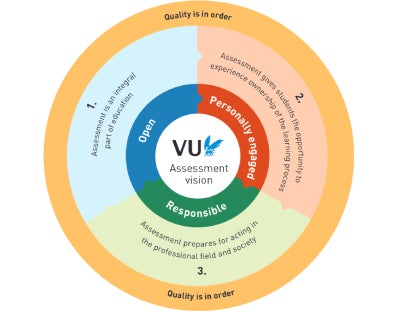The assessment vision aims to describe how the learning process and testing can relate to each other.
It is common to distinguish between formative and summative assessment:
- Summative evaluation moments focus on determining whether learning objectives have been achieved and progress decisions.
- The formative dialogue is an essential part of the learning process and focuses on answering three formative questions: what the student is working towards (feedup), where the student is standing now (feedback) and how the student can grow towards the desired situation (feedforward).[1]
When the learning process and summative assessment are well balanced, the formative dialogue and summative evaluation moments complement each other. The assessment vision invites programmes and lecturers to search for the optimal balance between the formative dialogue and summative assessment moments.
The vision on future-proof assessment is elaborated in three design principles, related to the core values of the VU. Read more about the design principles below or download the entire assessment vision, including inspiring best practices.
[1] Dominique Sluijsmans en Mien Segers, ‘Wat is nodig voor een toetsrevolutie in het hoger onderwijs? Vijf kernboodschappen voor de praktijk’, in: Dominique Sluijsmans en Mien Segers (red.), Toetsrevolutie: Naar een feedbackcultuur in het hoger onderwijs (Culemborg, Uitgeverij Phronese, 2018) 216-232: 222.
